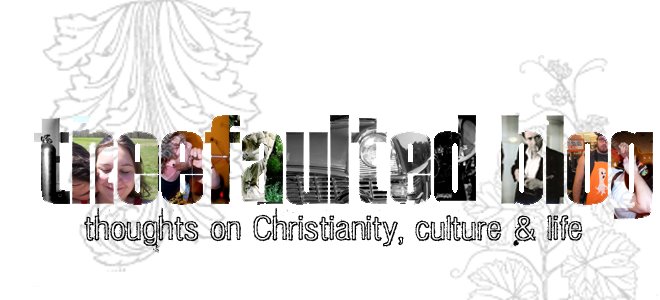14 You are the light of the world. A city set on a hill cannot be hidden. 15 Nor do people light a lamp and put it under a basket, but on a stand, and it gives light to all in the house. 16In the same way, let your light shine before others, so that they may see your good works and give glory to your Father who is in heaven.
In the last few days we've covered the Beatitudes. Here Jesus moves to his next point built off what he said in the previous twelve verses. In the beatitudes, or the norms of the kingdom as D.A. carson refers to them, Jesus explains the marks of a godly life. Here he moves a step forward. You see it is impossible to live the norms in a purely private way. The righteousness of the Christian life will attract attention, which will largely take the form of opposition. Jesus addresses this issue in the last beatitude and expounds upon with the illustration of salt and light.
Verse 13:"You are the salt of the earth, but if salt has lost its taste, how shall its saltiness be restored? It is no longer good for anything except to be thrown out and trampled under people’s feet."
 In the ancient world salt was used as a preservative. Jesus is saying apart from the presence of his disciples the world turns ever more rotten. So as the followers of Jesus become more like him and gain the attributes described in the beatitudes, they will become the salt which stops the deterioration of the world they live in.
In the ancient world salt was used as a preservative. Jesus is saying apart from the presence of his disciples the world turns ever more rotten. So as the followers of Jesus become more like him and gain the attributes described in the beatitudes, they will become the salt which stops the deterioration of the world they live in.
As for losing saltiness, the purpose of salt is to stop deterioration, therefore it must not itself deteriorate. If it does so, it no longer has a purpose, and it good only to be trampled on under foot.
Verses 14-16: 14 You are the light of the world. A city set on a hill cannot be hidden. 15 Nor do people light a lamp and put it under a basket, but on a stand, and it gives light to all in the house. 16In the same way, let your light shine before others, so that they may see your good works and give glory to your Father who is in heaven.
Heres Jesus reiterates his point with another illustration. Because we live in a world constantly connected to electricity, it is hard for most Americans to imagine true darkness. Unless you live in a secluded rural setting or have been camping far from civilization, you may never have experienced total darkness before. If you've ever been camping out hundreds of miles from civilization you will understand complete darkness. A city even a hundred miles away can alleviate the darkness. Its light bounces off clouds and water, and can bring at least some light to the area. This is how light works. A good light does not have to make everything like day, but it can shed enough light that darkness does not completely take over.
The listeners to Jesus sermon would have instantly known the sheer terror that can accompany complete darkness, and the value of light. Light was so important, they could not have imagined someone wanting to extinguish even a small flickering oil lamp.
Many have used these verses to justify wearing Christian T-shirts and putting "Are you following Jesus this close?" bumper stickers on their car. I think they miss the point of this passage by not reading it in context. Jesus is not saying, "If you do not go out and hand out tracts then your light has been hidden." No, rather he is expounding on the beatitudes. The Christian whose life shows the fruit described in the previous twelve verses is salt and light to a dark and decaying world. Look at what Jesus says in verse 16; In the same way, let your light shine before others, so that they may see your good works and give glory to your father who is in heaven.
In a world filled with tracts and street evangelism, it is interesting that Jesus says our righteousness, meekness, pureness, etc are what will be our witness to God. Again I think Jesus is putting emphasis on righteousness. To hunger and thirst for righteousness, is to hunger and thirst for God himself. To hunger for God is to be blessed by him, and to be blessed by him is to be a blessing to this world. When we no longer are hungering for God, and turn our attention to the world, we no longer point to God and his glory and grace; that is when we lose our saltiness and hide our light. We then are no longer a blessing to this world.




No comments:
Post a Comment